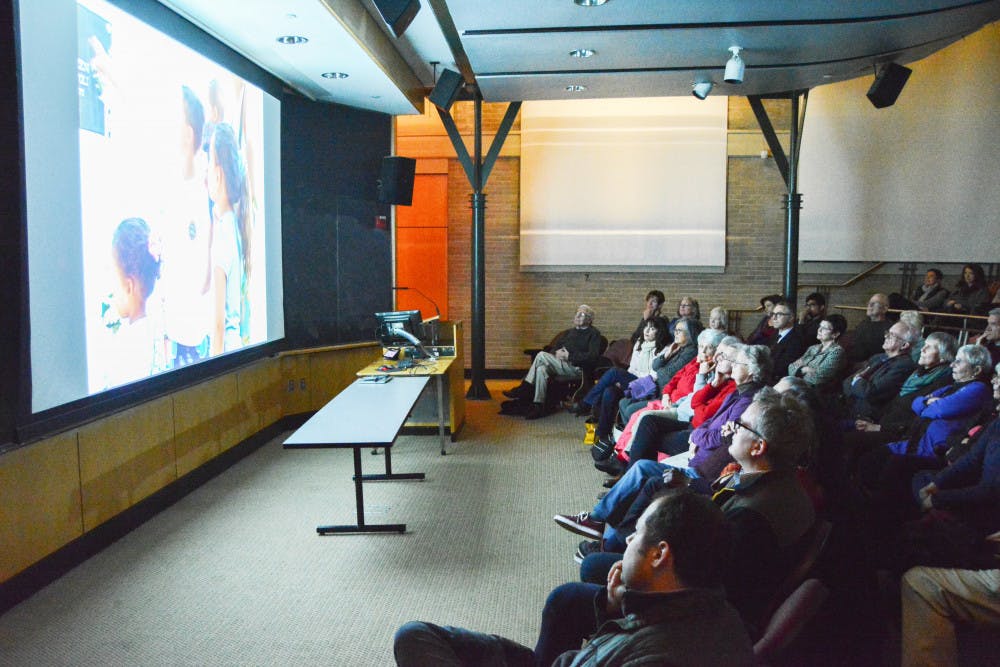Wednesday night, the rain echoed Professor of Anthropology Lina Fruzzetti’s tears as she told, in a soft, rhythmic voice, the story of her mother. As the crowd filled the room, she hugged the people she knew, transforming the space with strong, welcoming gestures that prepared the viewers to enter into her story.
Last night’s screening of “In My Mother’s House” was sponsored by the Office of the Provost. The event was a forum for “faculty sharing research with one another and building intellectual community,” said Provost Richard Locke P’17. The documentary film, created by Fruzzetti and her husband Ákos Östör, follows Fruzzetti’s mother’s story as an 18-year-old widow in Eritrea, raising the two children she had with the Italian colonial officer with whom she eloped. The film will make its public debut in January 2017.
Because she was away at boarding school, Fruzzetti did not learn her mother’s story until long into her adulthood after she had moved to the United States. When she asked her mother to disclose her past, Fruzzetti said she “realized what an amazing person she was, that there was a reason I always had her in front of me in every decision I made.”
“When my father died, she began working as a nanny in British homes. From there she went on to run one of the biggest businesses in the Sudan. As a Christian and a woman, she was very, very successful,” Fruzzetti said.
“In My Mother’s House” involves the viewer in an almost casual discourse, unraveling the story as Fruzzetti herself discovered the truths about her family.
In the film, Fruzzetti interacts with various family members, discussing family, colonialism and her mother’s story. As the film evolves, viewers get a sense of Italian and Eritrean cultures, each profoundly singular yet permanently intertwined. The scenes often revolve around meals: In spite of the cross-cultural tensions in a postcolonial environment, the familial gatherings — interspersed with shots of pastas, Italian wines and traditional Eritrean food — exhibit the strength of the cultural bonds that surpass the countries’ complicated history.
“It’s hard because the topic is difficult. … I had to deal with people who ignored my mother and brother,” she said. She described how her brother’s initial attempts to reach out to family members in Italy were futile until he had a friend suggest to the family that two Eritreans who had “made it big in America” were looking for their Italian relations. Soon after that, they heard from their cousins.
Fruzzetti also discussed navigating the postcolonial atmosphere as a refugee. “As a person of color, where do I feel mostly comfortable and at ease? In Italy, I have a problem because I’m half Italian. In Eritrea, I’m half Italian. When I’m in India, people don’t question who I am because I look like them. In the (United States), I feel comfortable: I have some rights. There’s a law I can adhere to if there’s an issue,” she said.
Fruzzetti hopes “others can learn from the film and see relevance in their own lives if they have gone through similar things.”
The film has been shown around the world, with outstanding responses in Italy and India. After a showing in her father’s hometown, people hugged Fruzzetti on the street, apologizing to her for Italy’s colonial history. In India, viewers compared the film to India’s relationship with Pakistan. The story transcends the limits of context, she said.“It’s the human story of families falling apart.”
The questions the film poses echo Fruzzetti’s work in the anthropology department. “My research is all about women,” she said. “I work on the construction of gender.”
When pursuing her research, she often asks “questions of what happens to women when they deviate from tradition.” In this film, she realized that when “looking at the strength of women and young girls” who made their own decisions, “all along I had my mother in my mind.”





